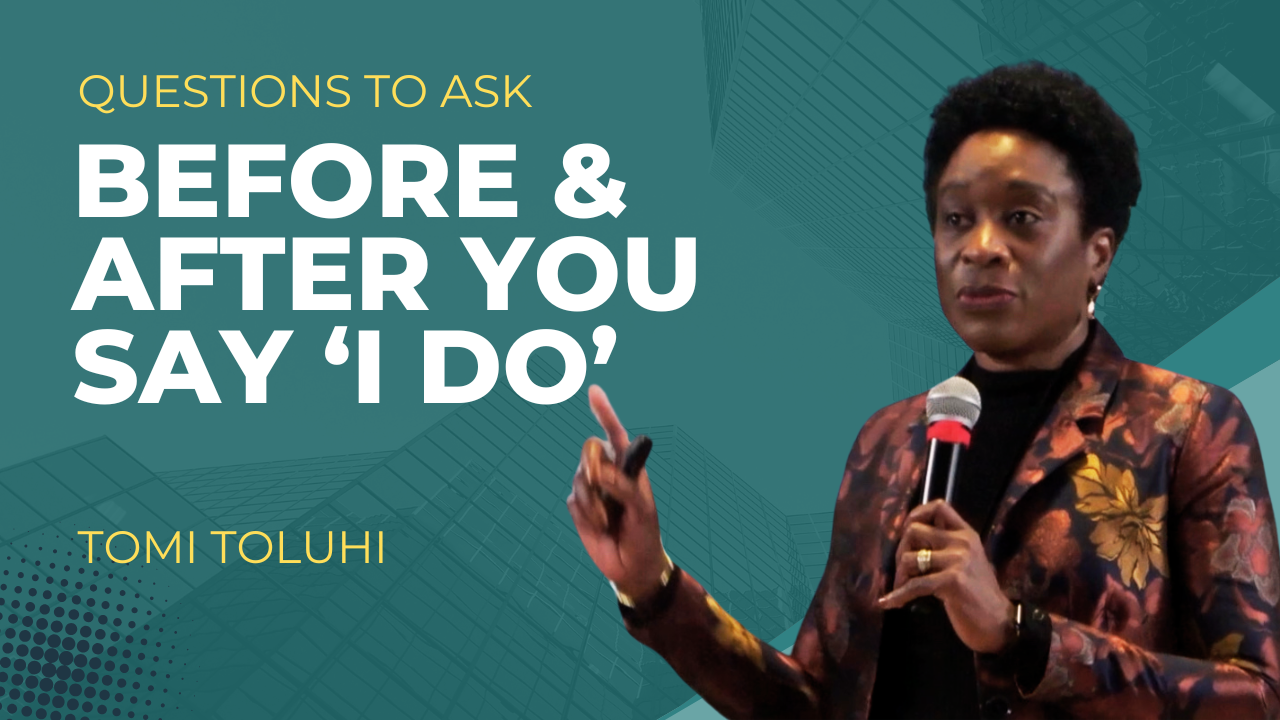When a spouse withholds sex
Recently I received an email from a wife which touched my heart. I could feel her pain as she penned the words of her message. ‘I’m married to an introvert husband who doesn’t appreciate bonding with me. He sees sex as a thing to be done when he is ready. He’s never available for my needs. I’m just frustrated! What do I do?’ It was a cry from her heart for a deeper connection with the man she had pledged her life to; a cry that was being ignored. I have seen this scenario played out in many marriages. More frequently it is the husband who expresses frustration at his wife’s lack of sexual interest. However, women who find themselves in this situation are particularly vulnerable because of the societal expectation that men should be sexually aggressive while women should be sexually passive. As such, a woman who wants sex more frequently than her husband may find that she is vilified, labelled and disregarded.
The Bible clearly addresses the issue of conflicting sexual expectations in marriage so that we are not left to wonder what God’s mind is on the matter. In 1 Corinthians 7:1-5 we read a clear statement of how God designed the sex life of a married couple to function and thrive.
“Now concerning the things of which you wrote to me: It is good for a man not to touch a woman. Nevertheless, because of sexual immorality, let each man have his own wife, and let each woman have her own husband. Let the husband render to his wife the affection due her, and likewise also the wife to her husband. The wife does not have authority over her own body, but the husband does. And likewise the husband does not have authority over his own body, but the wife does. Do not deprive one another except with consent for a time, that you may give yourselves to fasting and prayer; and come together again so that Satan does not tempt you because of your lack of self-control.”
There are a number of principles to be gleaned from this scripture by any couple seeking to enjoy the healthy sex life which is a crucial part of a happy marriage.
1. Free yourselves from the myth of matching libidos
There is a tendency for some married couples to buy into the myth of matching libidos which suggests that when a couple are in love their sex drives will be perfectly matched and synchronised. Nothing could be further from the truth. In fact, if that was the case, this scripture would be irrelevant. Any honest couple who have been married for any length of time can tell you that rarely do they feel like having sex at the same time. It’s one of those things that when it’s on your mind, it might be the farthest thing from your spouse’s mind! Additionally, typically one partner will tend to want sex more frequently than the other and sometimes there can be a reversal of roles after some years because of age, biological changes, seasons of life and the like. This scripture is freeing because it presents a realistic picture of what sex in marriage really is like. Sometimes your needs will coincide but often they won’t. So how do we address this imbalance?
2. Recognise that denying your partner of sex exposes them to sexual temptation
Let’s be clear about what this scripture is not saying. It does not imply that a married person can seek sexual gratification outside marriage and then blame their spouse for their indiscretion. Before God, we are each responsible for our choices; Adam and Eve quickly learnt that after their encounter with the serpent in the garden. God held them individually responsible for their choices. Nevertheless, one of the things every Christian spouse should be aware of is that you are the only legitimate outlet through which your spouse can express their God-given sexual desires. Any other sexual outlet – adultery, pornography – would contravene God’s word. Being sensitive to this sacred responsibility is part and parcel of the covenant of marriage. If you refuse to meet your spouse’s legitimate needs, who will?
3. Remember that sacrificial love was what you signed up for
Marriage consists of pleasure and sacrifice in equal measure. On one hand, we experience the extreme joys of companionship, mutual support and friendship which take us to indescribable heights of wellbeing. On the other hand, I believe a godly marriage is a universal cure for selfishness because God always calls us to a higher level of sacrifice in the way we respond to our spouse’s needs. Sometimes, meeting your spouse’s sexual needs will be an absolute pleasure, especially when those needs coincide with desires in your own heart. At other times, it can be a sheer sacrifice when you have to look beyond yourself and reach out to be a blessing to your spouse. The Bible makes it crystal clear that when you marry, you give up the right to claim your body as your own; you are merely a custodian. The husband gives up ownership of his body to his wife and vice versa. To seek to dispense and measure out your sexual attention to your spouse at your convenience is therefore not a scriptural option. God feels so strongly about this that even spiritual activity, like fasting, is not considered to be a legitimate reason to refuse your spouse’s needs! Abstaining from sex for spiritual reasons requires your spouse’s consent.
4. Be mutually considerate
The scriptures consistently promote the principle of mutual consideration; do unto others what you would like them to do to you. Treat your spouse with the same level of concern you would like to receive. Sometimes there are circumstances in a spouse’s sexual journey that call for just this. A man might experience a temporary disinterest in sex due to work stresses he is enduring; or a woman might experience a temporary loss of interest in sex due to hormonal changes. If you are the partner who is disinterested, you need to realise that your spouse’s sex drive is not going to disappear simply because yours has. Their needs are no less legitimate because they don’t coincide with yours. As such you need to make an extra effort in spite of how you feel. ‘Act more sexual than you feel’, is my advice in such circumstances. On the other hand, if you are the one who desires sex when your spouse doesn’t, express consideration of the difficulties your spouse is going through and appreciation for every effort made to meet your sexual needs during what is clearly a trying time. Sometimes, putting aside your expectations for a moment so that you can express genuine concern for the underlying reasons behind your spouse’s loss of interest can be the trigger they need to recapture their passion.
5. Find a formula that works for you as a couple
Your sex life is not all about you as an individual. Sex was designed by God to be a selfless act so that you get the most out of it by giving the most into it. The ability to be sensitive to each other’s desires when engaging in marital sex is probably one of the greatest keys to a fulfilling sex life. This is particularly important for husbands to remember because a woman is designed to respond more slowly and may require more time and tenderness. The key to being a great lover to the wife God gave you is not a macho, self-serving focus on your own needs. Some women lose interest in marital sex because they don’t feel listened to and their desires are ignored. There is an entire book in the Bible, Song of Solomon, which deals with the romantic side of the marriage relationship. Any husband who takes a cue from this great book in the Bible will reap the rewards in a more responsive wife.
6. Seek godly marriage counselling
Sometimes the sexual difficulties in a marriage are such that engaging a trained, godly counsellor to speak to you as a couple is the way forward. There is also a wealth of knowledge that can be gained from reading books that deal with this topic. I always stress the importance of making sure that your sources are scriptural as they will shape your thinking. One book that helped me tremendously, which I consistently recommend, is ‘The Act of Marriage: The beauty of sexual love’ by Tim and Beverly La Haye. It is a timeless classic that contains a beautiful balance of scripture and medical knowledge and is an easy read for any couple truly serious about achieving sexual harmony. Don’t be afraid to admit you’re not an expert. Seek help!










